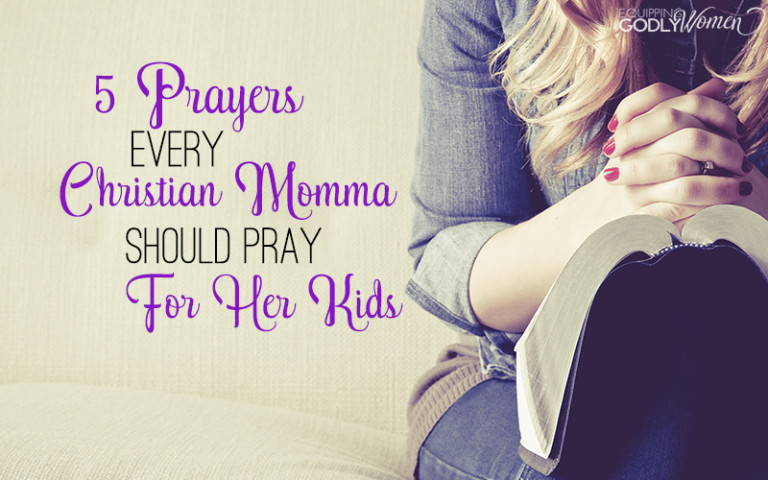Biblical Motherhood: What Does the Bible Say About Mothers?
In this article, Erin Odom digs into what the Bible says about biblical motherhood, what the Bible says about mothers, whether or not Christian mothers can work, and more!
Motherhood can be one of life’s most beautiful yet challenging experiences. If you’ve ever wrestled with questions like, “Am I doing this right?” or “Does the Bible tell me exactly how to mother?” you’re not alone.
Many of us grew up in Christian homes or faith communities where the phrase “biblical motherhood” carried specific expectations and standards. For some of us, this concept stirs up fond memories and the warmth of our own mothers. But, for others, the phrase carries a negative connotation and is associated with a picture of motherhood that we’ve never been able to uphold.
Throughout Scripture, we find timeless wisdom, real-life examples, and beautiful truths about motherhood. But we also find something surprising: the Bible doesn’t always spell out “biblical” motherhood the way our modern Christian culture does.
Today, we’re going back to the source —God’s Word —to uncover what the Bible actually says about mothers, the qualities that characterize godly motherhood, and how Christian moms can walk faithfully, regardless of their work status, family makeup, or season of life.
If you’re wondering, “What Does the Bible Say About Biblical Motherhood?”, you’re in the right place.

In this article, we delve into Scripture to explore what God says about biblical motherhood. We will also examine how a segment of our Christian subculture has addressed this subject, demonstrating that the teachings of various denominations on this topic over the past few decades do not necessarily align with the teachings of God’s Word.
*This article contains affiliate links. Please see our full disclosure policy for details.
What Does the Bible Say About Biblical Motherhood?
The phrase “biblical motherhood” is never specifically mentioned in the Bible. However, Scripture contains different descriptions of what embodies a godly mother.
In this post, I’ll use the words “biblical,” “godly,” and “Christian” interchangeably when describing mothers. When believers refer to something as “biblical,” they usually mean that it originated in the Bible.
Much of what we know about biblical motherhood is painted in Scripture as characteristics of Christian parents. In fact, the Bible does not often differentiate between the roles of mothers and fathers.
Many biblical descriptions of mothers (or parents in general) are also attributes of Christ Himself. Whether we are mothers, fathers, or remain single and childless throughout our lives, our ultimate goal should be to become more like Christ, regardless of our life circumstances. While exploring the following features of godly mothers, it is essential to note that every believer should strive to become more like Christ and, therefore, adopt these qualities as well.
What Does the Bible Say About Mothers?
The Bible says many things about mothers, and God’s Word is clear that they are to be respected and revered. One of my favorite examples is when Jesus, while still hanging on the cross, asked his beloved disciple, John, to care for His mother, Mary (John 19:26-27).
Scripture provides us with examples of various godly mothers — from Sarah, Rachel, Jochebed (the mother of Moses), and Hannah in the Old Testament to Elizabeth, Mary, Lois (the grandmother of Timothy), and Eunice (the mother of Timothy) in the New Testament.
These mothers are highly esteemed and pictured as having an integral part in their offspring’s legacies.
The following are characteristics we see of biblical motherhood throughout Scripture:
1. The Bible Describes Mothers As Comforting (Isaiah 66:13).
“As a mother comforts her child, so will I comfort you; and you will be comforted over Jerusalem.” –Isaiah 66:13
This Scripture verse describes a mother comforting her child. Ultimately, this passage describes God as a comforter as well, and Isaiah uses mothers as an example of how tenderly God comforts His children.
2. Scripture Shows Mothers As Not Forgetting Their Babies (Isaiah 49:15).
“Can a mother forget the baby at her breast and have no compassion on the child she has borne? Though she may forget, I will not forget you!” –Isaiah 49:15
In the Bible, the prophet Isaiah shows mothers not forgetting their babies. The prophet uses godly mothers as an example of how God cares for His children as well. However, Isaiah takes things a step further here and mentions that even mothers sometimes forget, but God promises never to forget His children.
3. God’s Word Calls Mothers Compassionate (Isaiah 49:15).
“Can a mother forget the baby at her breast and have no compassion on the child she has borne? Though she may forget, I will not forget you!” –Isaiah 49:15
Godly mothers display compassion for their children. Yes, this is the same Scripture as the previous one, but here we see that, in the second part of the verse, Isaiah focuses on mothers demonstrating compassion for their children. Like good mothers, God is also compassionate toward His children.
4. Godly Mothers Find Joy in Motherhood Despite the Pain and Anguish of Childbirth (John 16:21).
“A woman giving birth to a child has pain because her time has come; but when her baby is born she forgets the anguish because of her joy that a child is born into the world.” –John 16:21
Most women who have given birth can attest that a sweet, cuddly newborn possesses some kind of magical powers that help a mother “forget” the pain and trauma of childbirth. Otherwise, no one would ever have more than one child! The joy a child brings exceeds the pain the mother endured to birth him or her.
John uses the analogy of a mother in labor–and the aftermath when she “forgets” the horror of the experience–as an analogy for believers expecting Christ’s return. Christians must endure living in a sin-stained world while waiting for Christ Jesus and the beauty of Heaven.
One day, we will all be able to say that the waiting was worth it because of the joy we will have in eternity with Him. Like a good mother, we will forget the anguish of this world once we are in Christ’s presence.
5. Christian Mothers (and Fathers) Should See Children as a Heritage–or a Gift–From the Lord (Psalm 127:3).
“Children are a heritage from the Lord, offspring a reward from him.” –Psalm 127:3
Godly mothers see their children as a heritage—or an inheritance—from the Lord. Inheritances are good things. I appreciate how this verse is translated in the New Living Translation: “Children are a gift from the Lord; they are a reward from Him.”
A gift! Yes, there may be times when our children drive us crazy and when we don’t even feel cut out for motherhood, but it’s important to remember that our children are ultimately some of the most precious gifts the Lord will ever give us.
6. Godly Mothers Should Train Their Children (Proverbs 22:6).
“Start children off on the way they should go, and even when they are old they will not turn from it.” –Proverbs 22:6
The Bible describes godly mothers as taking seriously the command to teach their children the faith. Another version of the Bible—the New King James Version—translates “start” as “train.”
Many believers have misinterpreted this proverb as a prescriptive promise, leading Christian mothers (and fathers) to erroneously believe that if they parented a certain way, their children would never rebel or walk away from the Christian life.
While Scripture does admonish us, as Christian parents, to train our children, proverbs themselves are not promises. Instead, they are concise nuggets of wisdom that provide us with principles for living a godly life. We are setting ourselves up for disappointment (and possibly disillusionment) when we attach a promise to Scripture that was never meant to be a guarantee.
Others have used this isolated Proverbs 22:6 Scripture as “proof” that biblical motherhood means they must homeschool. My oldest child is now a sophomore in high school, and I’ve done it all—homeschooled, hybrid (private, Christian) school, charter school, and public school.
I don’t believe that there is only one “biblical” way to school children, and I certainly don’t see evidence of that in Scripture. Yes, God leads some mothers to homeschool, but Proverbs 22:6 does not command us to do so.
7. Christian Mothers Should Disciple Their Children (Deuteronomy 11:18-19 and Deuteronomy 6:6-7).
“These commandments that I give you today are to be on your hearts. Impress them on your children. Talk about them when you sit at home and when you walk along the road, when you lie down and when you get up.” –Deuteronomy 6:6-7
Godly mothers are called to disciple their children–but it doesn’t have to be in a stuffy or formal setting (not in the least!).
In His sovereignty and foresight, the Lord knew how busy our lives would be as parents. (And even though they are possibly much busier today than in the Old Testament world, I’m not convinced that parents back then were simply sitting around spending time with their kids all day, every day. Back then, they had to hunt, gather, cook every single meal from scratch, make their own clothes, and walk anywhere they wanted to go. I am sure mothers and fathers were often preoccupied with just trying to survive!)
Whether we’re just trying to make it through to the next day or we are busy with other obligations, there is no excuse not to disciple our children and teach them Christian truths.
In Deuteronomy, we’re admonished to disciple our children whether we are sitting at home, en transit, going to sleep, or getting up in the morning.
Essentially, Scripture instructs us to incorporate discipleship into our everyday parenting.
We see this in Deuteronomy 6 (above), and Moses reiterated this practice later in the book, in chapter 11:
“Therefore you shall lay up these words of mine in your heart and in your soul, and bind them as a sign on your hand, and they shall be as frontlets between your eyes. You shall teach them to your children, speaking of them when you sit in your house, when you walk by the way, when you lie down, and when you rise up.” –Deuteronomy 11:18-19
8. Godly Mothers Should Accept and Respect Their Children (Mark 9:36-37 and Matthew 19:14).
“He took a little child whom he placed among them. Taking the child in his arms, he said to them, ‘Whoever welcomes one of these little children in my name welcomes me; and whoever welcomes me does not welcome me but the one who sent me.'” –Mark 9:36-37
The Bible teaches—through Jesus’s actions—that godly parents should treat their children with acceptance and respect.
Have you ever heard the saying: “Children should be seen and not heard”? It was a common adage when I was a child. However, I believe this belief is contrary to how Jesus saw and treated children in Scripture.
“Jesus said, ‘Let the little children come to me, and do not hinder them, for the kingdom of heaven belongs to such as these.'” –Matthew 19:14
9. Biblical Mothers Teach Their Children About God’s Faithfulness (Deuteronomy 4:9).
“Only be careful, and watch yourselves closely so that you do not forget the things your eyes have seen or let them fade from your heart as long as you live. Teach them to your children and to their children after them.” –Deuteronomy 4:9
The Bible encourages mothers (and fathers) to teach their children about what they’ve seen God do in their lives. Testimonies of God’s faithfulness can endure for generations if we, too, are faithful in passing them along to our descendants.
10. Christian Mothers Gain Immense Joy When Their Children Walk with Jesus (3 John 1:4).
“I have no greater joy than to hear that my children are walking in the truth.” –3 John 1:4
There is perhaps no greater joy for a mother than seeing her offspring follow and worship Jesus.
While the above passage from 3 John refers to the apostle’s joy when hearing of his disciples and fellow believers walking with Jesus, it can also be applied to mothers who have raised their children to know and love Jesus.
11. Biblical Mothers Fear God and Keep His Commands (Deuteronomy 5:29).
“Oh, that their hearts would be inclined to fear me and keep all my commands always, so that it might go well with them and their children forever!” –Deuteronomy 5:29
Mothers lead by example. A biblical mother will fear God and keep his precepts.
Our children more often do as we do rather than as we say. As believers, modeling fear of God and obedience to His commandments is integral to our children’s faith formation.
12. Christian Parents Don’t Provoke Their Children to Anger (Ephesians 6:4 and Colossians 3:21).
“Fathers, do not exasperate your children; instead, bring them up in the training and instruction of the Lord.” –Ephesians 6:4
Biblical mothers (and fathers) don’t seek to anger their children. The passage from Ephesians above is one that I often quoted to my father when I was a teenager. Now, things have come full circle for me, as my own teenagers have quoted these Bible verses to me!
The Apostle Paul saw the sin of parents provoking their children to anger as important enough to mention it in his letter to Colossae as well:
“Fathers, do not embitter your children, or they will become discouraged.” –Colossians 3:21
13. Godly Mothers Discipline Their Children (Proverbs 29:17).
“Discipline your children, and they will give you peace; they will bring you the delights you desire.” –Proverbs 29:17
Scripture admonishes parents to discipline their children. Now, the Bible is not clear on exactly how we are to discipline (contrary to what some Bible teachers and denominations teach), but it is crystal clear that we are to administer consequences for sinful behavior.
What Does the Bible NOT Say About Biblical Motherhood?
The Bible never says that biblical motherhood is synonymous with being a stay-at-home mom. Yet, over the past several decades, biblical motherhood has become increasingly comparable to being a stay-at-home mom, at least in some Christian subcultures and denominations.
When we look at the whole of Scripture, nowhere does it say that godly mothers must stay home with their children. (In fact, even the famous Proverbs 31 Woman worked!)
As I’ve wrestled with the question of biblical motherhood, sought the Lord, and studied Scripture during nearly 17 years of parenting, I’ve come to realize that God’s calling on each of our lives is not a cookie-cutter approach. A woman can live out the above 13 characteristics of what Scripture would call “biblical”—or, my preferred word choice, “godly”—motherhood without being a full-time stay-at-home mother.
He may call one mother to stay home with her kids, while He calls another to work full-time. Still, He may equip others with an entrepreneurial spirit that enables them to start businesses and earn an income from home.
My Personal Views of the Juxtaposition of Biblical Motherhood With the Working Vs. Stay-at-Home Mom Debate
Undoubtedly, being a stay-at-home mom is something incredibly noble, rewarding, and sacrificial. It’s most definitely something I desired when my children were little. I even wrote a book about how to live frugally and make money from home, allowing you to stay home with your kids.
My book, You Can Stay Home With Your Kids, was published by HarperCollins Christian in April 2018. Seven years to the week of its publication, I began a full-time, remote job with the same publisher.
For the past 16 years, I’ve stayed home with my children, but I’ve never been a full-time stay-at-home mom. I worked from home as a self-employed entrepreneur.
While God blessed my family immensely with the flexibility that self-employment gave me for so long, I couldn’t be happier with my new job. This job combines my education, skills, experience, and passion for writing, business, and ministry. I’m marketing online Bible studies for a major Christian publisher, and I’m thrilled about this opportunity.
At the time of writing, my four children are 16, 14, 12, and 8 years old. Does it make me less of a “biblical” mother now that I am working a full-time job? I don’t think so. In fact, I believe walking into this opportunity, which I fully believe came straight from the Lord, may make me a more godly mother than I was before.
While I don’t regret for a minute the years I spent working for myself and being home with my kids, I can now admit that I am more fulfilled, confident, and a better (and less burnt out!) mom when I am also living out my calling somewhere other than my home.
I deeply resonate with how another working-in-ministry mother wrote about this topic in her blog post titled “Should Christian Moms Work?”:
Turns out, God never says all Christian moms have to stay home. God calls us to love our kids unconditionally, talk to them about Jesus, discipline them, teach them in the way they should go, and model what it looks like to follow Him. But, He doesn’t say, “Moms must stay home.”
What were you taught about biblical motherhood? Have your beliefs or opinions changed over the years? If so, how so?






